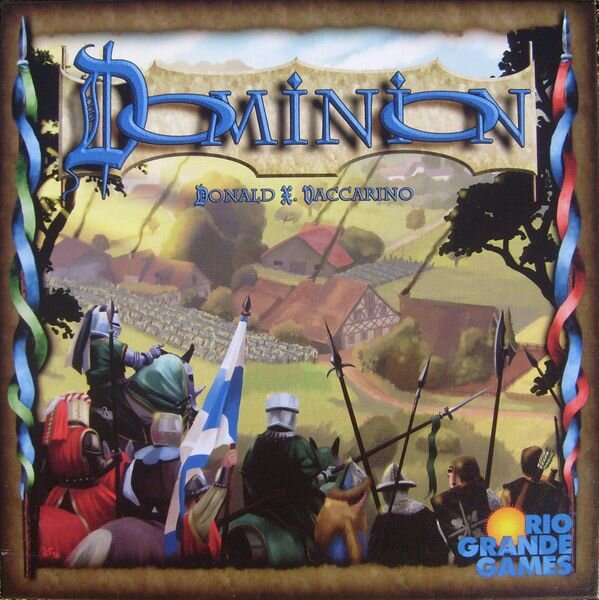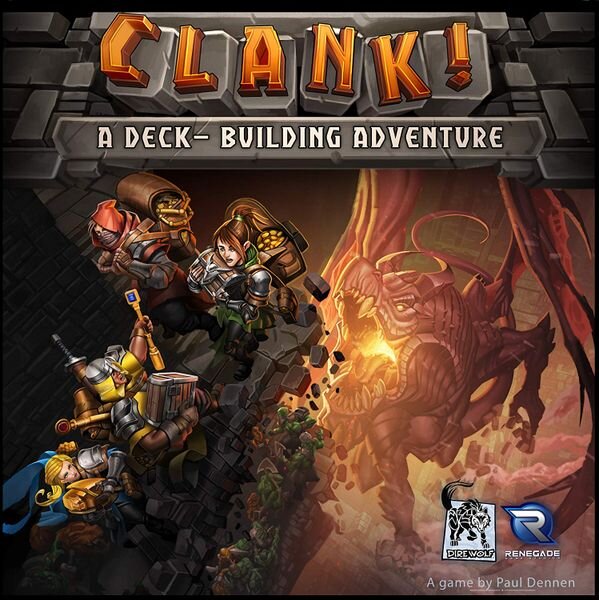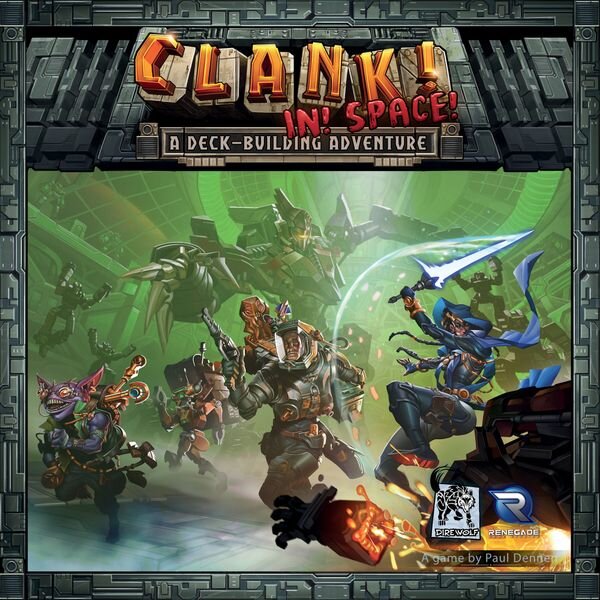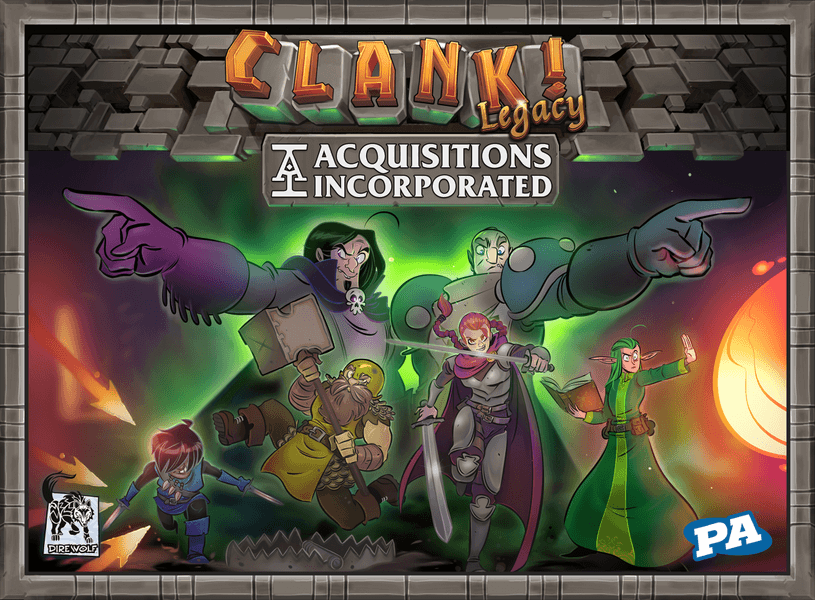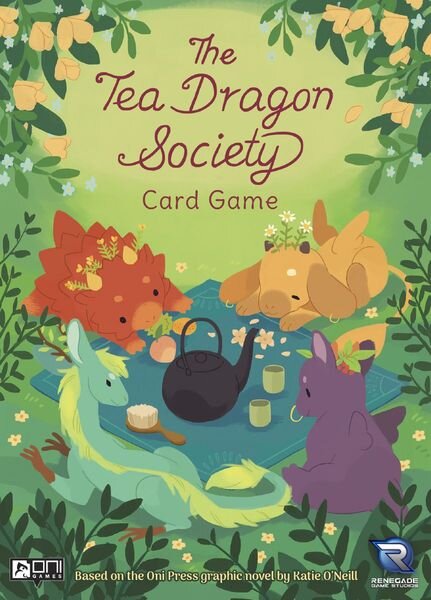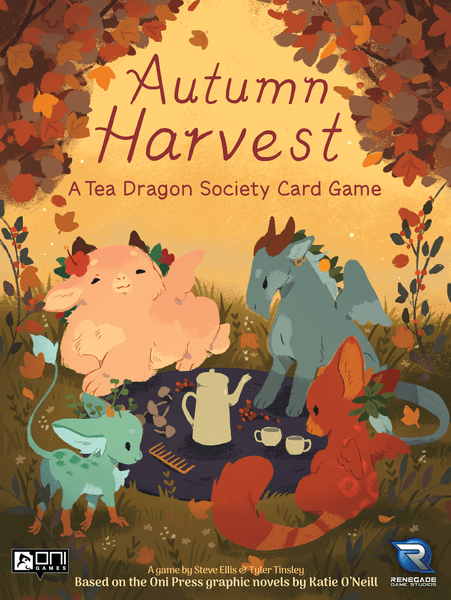18 Deckbuilding Games Worth Your Consideration
What is a deckbuilding game? It’s a game where you start with a deck of simple, weak cards, and over the course of the game, you buy new cards that are shuffled into your deck. By the end of the game, you’ll have a customized deck where each hand of cards that you draw will (hopefully) be significantly more powerful than the ones you started with. This genre was first popularized by Dominion in 2008, and has really taken off in the past 15 years. Nowadays, there are a ton of awesome deckbuilding games to choose from. Here are some of my favorites, in no particular order!
Dominion
The original deckbuilder, and still probably the purest example of the genre. Pretty much all the other deckbuilders on the market can trace their lineage directly back to Dominion. It's very accessible, even to non-gamers, and the modular setup combined with a plethora of expansions means that it has tons of replay value.
Fun fact: Dominion can be played online for free at https://dominion.games/.
Ascension
Ascension was one of the earliest deckbuilding games to hit the market after Dominion first introduced the genre to the market. It features two currencies rather than Dominion's one: runes are used to buy new cards for your deck, while power is used to defeat monsters for points and one-shot bonuses. Since its original release, it's received lots of expansions, most of which also function as standalone base games in their own right.
I actually don't like the original core game all that much by itself. It's fine, I guess. However, I do like it with expansions. My favorite is Ascension: Realms Unraveled.
Valley of the Kings
In Valley of the Kings, you are a mighty pharaoh ruling over Egypt, and at the end of the game, you die. But here's the good news: whatever wealth and riches are entombed with you in your pyramid will remain with you in the afterlife! It turns out you can take it with you. Of course, if you bury all your stuff now, you won't be able to enjoy it while you're alive. Hmm. Decisions, decisions.
This game is a delicate balance between keeping cards in your deck, where you can benefit from their effects, and entombing cards in your pyramid, where they will score points at the end of the game. Any cards that you fail to entomb before the deadline are worth nothing, so knowing when to pivot from collecting more treasures to burying them away is key. It's a nice little wrinkle on the formula, and it plays well.
There were originally three different standalone variants of the game. I have Valley of the Kings: Afterlife (the second of them) in my personal collection, and I like that it all fits in a tiny little box. However, the big-box Premium Edition collection, which includes all three expansions plus bonus content, and uses deluxe tarot-size cards. On the one hand, portability...on the other hand, more content. It would be a tough decision, except the smaller individual editions are now out of print. So, for new buyers, it'll probably be the big box!
Mystic Vale
Now here's a unique take on the genre. Instead of adding cards to your deck, you add abilities to your cards! The gimmick is, all the cards come in sleeves, and the upgrades for them are printed on clear plastic. So you slide the upgrade into the sleeve and it occupies one of three upgrade slots on that card.
It's a neat gimmick, and the game underneath it is also neat. In addition to deckbuilding, there's a major push-your-luck element to it: you can draw any number of cards on your turn...if you dare. But as soon as you flip over four of the little red symbols, your harvest spoils, and you discard everything and skip the rest of your turn.
I like Mystic Vale. It is a good game. I've played the base game quite a lot, and now I'm at the point where I've seen all the cards and I'm ready to mix in an expansion.
Clank!
In Clank!, players are adventurers delving into a dungeon, trying to grab as much treasure as they can carry and then get out before the dragon wakes up and eats them. It's a wonderful combination of deckbuilding plus old-school movement around a board, topped off with a slice of push-your-luck to give it that extra zing.
The deckbuilding mechanics in Clank! are reminiscent of Ascension, with one currency (blue) used to purchase cards to add to your deck and another (red) used to fight monsters for one-time benefits. But there's also a third currency (yellow), which is used to move your token around the map. As you move through the dungeon, you'll explore rooms, finding treasure (some of which is fixed, some of which is randomized) and fighting your way past guards and hazards. The deeper you delve, the more points you can earn—but the farther you stray from the safety of the surface, the more likely it is that the dragon will find and carbonize you before you have time to make it out again.
Over the course of the game, players will make noise, represented by color-coded Clank! cubes that are added to a bag. Every so often, the dragon will attack, and a number of Clank! cubes will be drawn at random from the bag. If they show your color, you take damage. Too much damage and you die, which usually means you lose. In other words, you'll want to avoid making noise—or trick your opponents into making more noise than you.
I like Clank! because of how seamlessly it blends its different mechanisms into a fun and story-rich gaming experience. Once the first player dies or escapes the dungeon, an end-of-game countdown starts, which means the game tends to run at a fast pace, rarely overstaying its welcome. I appreciate that. The base game has plenty of variety in it, including two different boards, but there are also quite a few expansions that can increase longevity even further. My biggest complaint is that it takes a little while to find and set up all the tokens and fiddly bits on the board at the start.
Clank! In! Space!
It's Clank!, but in space!
Okay, it's not exactly like the original. Besides being re-themed, Clank! In! Space! has a few extra mechanisms that make it a slightly different experience. The biggest change is that you have to explore more of the map and complete an extra objective before you're able to escape from the evil Lord Eradikus's spaceship with your ill-gotten goods. This means games will tend to run longer, which, depending on your preference, might be good or bad. For me, I prefer the more streamlined pace of the original, but I know some people like to linger more and savor the expensive cards they've bought for their endgame deck.
Either way, can't go wrong, they're both great.
Clank! Legacy: Acquisitions Incorporated
It's Clank! as a legacy game. What more do I need to say? Clank! is awesome, and legacy games are...well, they're not for everyone, but for the people they are for, they're awesome. So, put the two together, and they're awesome together.
You do kinda need a dedicated group to run through the campaign; you can't really pull it out for just one night and then forget about it afterwards. I mean, you can, but...you know what I mean.
The Quest for El Dorado
The Quest for El Dorado is similar to Clank! in that it combines deckbuilding with movement on a board. I'd venture to say that if you like one, you'll almost certainly like the other, as they're both excellent games.
In this one, it's a race rather than a dungeon crawl. Instead of delving into a dragon's lair in search of loot, you'll play cards to move your explorer through the hex map of the South American jungle in search of the Golden City. But be quick, because everyone else is searching for it as well. First one to find El Dorado wins!
I haven't personally played this one, but I have read the rulebook, and it seems very robust. And of course, it's just swimming in glowing reviews and general critical acclaim. Currently, The Quest for El Dorado sits near the top of my list of Games I Really Want To Play But Haven't Been Able To Yet.
The Tea Dragon Society Card Game
These are two variants of the same game; if you have both, you can combine them together. Both games are incredibly adorable, featuring beautiful illustrations based on the Tea Dragon Society graphic novel.
Unlike most deckbuilding games, you have no hand of cards here. On your turn, you either flip a card from your deck directly into play, or you discard cards from play to purchase a new card. It's a style of gameplay that is simple, fast-paced, and relaxing. The mechanics also do a wonderful job of capturing the feel of the book the game is based on.
Of the games on this list, I think this is one of the most accessible to non-gamers, both because of its simple rules and its appealing aesthetics. And if you're a fan of the franchise, it's a must-have.
Lost Ruins of Arnak
Lost Ruins of Arnak combines deckbuilding with worker placement into a lovely hybrid that ended up being one of the hottest games of 2020, winning a Golden Geek Game of the Year award, a Kennerspiel des Jahres nomination, and a pack of other nominations.
Players are brave explorers in a pulp adventure setting, searching for the eponymous ruins. On your turn, you can play an action card from your hand to gain its effect or place your archaeologist on one of the spaces on the board to gain its effect. There are lots of ways to earn points, and whoever has the most points at the end of five rounds wins the game.
This is just a really well-executed game on basically all fronts. The gameplay is great, the art is great. It is on the moderately complex side—there are a lot of moving parts—but if you've played deckbuilding games and worker placement games before, that foundation should make Lost Ruins of Arnak a breeze to learn. (Also, the rulebook is well-written, which helps a lot.)
I would definitely recommend giving Lost Ruins of Arnak a try if you are a board game hobbyist. You can try a digital version for free at https://en.boardgamearena.com/gamepanel?game=arnak. For less experienced players, The Quest for El Dorado might be a better place to start; it has similar themes and mechanics, but it's simpler and more accessible.
Shadowrun: Crossfire
Shadowrun: Crossfire is a cooperative deckbuilding game (in the Shadowrun universe), except it's played in a campaign, so you can gain permanent upgrades. Like, you put stickers on the cards. It's a legacy game. I think that's really neat.
Of course, this means it comes with all the usual upsides and downsides of campaign-style games—most notably that you really need a consistent group that will meet on a regular basis to play it. If you can swing that, it'll probably be awesome, because you'll get to tell a story through the missions, and level up, and stuff! And it has a lot of content! It's the sort of board game that you can treat almost like a tabletop RPG. In fact, they even came out with a Dungeons & Dragons variant of it called Dragonfire. I think this concept works great in the Shadowrun universe, though. If anyone needs a player for a Shadowrun: Crossfire campaign, hit me up.
Dice Forge
In Dice Forge, players are heroes trying to impress the gods by completing awesome feats of heroism! Everyone starts with two humble dice with modular faces. Over the course of the game, you'll upgrade your dice by physically exchanging the existing faces for new, more powerful ones, LEGO-style. Each roll of the dice grants you resources which can help you complete heroic quests to gain treasure and glory.
I love this game. Love it to pieces. First off, it's gorgeous. All the components are great quality with beautiful illustrations in a charming and colorful aesthetic. Secondly, the tactile feel of prying a face off of your die and clicking the upgraded face in its place? Unparalleled. Third, the gameplay holds up! It holds up really well! The game is fun, with a healthy enough mix of strategy and luck that you can feel like you're in control of your gameplan while also being surprised at what happens next. And the modular setup provides replay value: there are two sets of cards that you can mix and match or move around. And, like, it's just a really strong, polished experience, like, overall.
The Dice Forge: Rebellion expansion adds tons more content too, unlocking more options and new advanced strategies.
And yes, it's a dice-building game, not a deckbuilding game. But look, they're the same thing, okay? Shut up. It's great.
Direwild
Okay. Imagine. Dungeons & Dragons...meets Pokémon...as a deckbuilding game. That's Direwild in a nutshell.
It's a fully cooperative hybrid of deckbuilding and dungeon-crawling. You're fighting monsters as a team, but you're also capturing monsters and recruiting them onto your side.
Anyway, I'm not really a co-op gamer, and I haven't played Direwild yet. But I gotta give 'em props for the high concept. It sounds cool, right?
The Red Dragon Inn: Battle for Greyport
Battle for Greyport is a cooperative deckbuilding game based on the world of The Red Dragon Inn. The city is under attack by monsters and pirates, and you and your friends must defend it!
I haven't played this one yet, but I heard that it's tough as nails. You'll play through a scenario and recruit heroes and buy items and all that jazz, except monsters are going to be hitting you in the face while you're doing it, and if anyone drops to 0 HP, the whole team loses. If you like the idea of teaming up with your friends instead of squabbling amongst one another, or even playing solo (which is a thing you can do here), this might be the deckbuilder for you. Just be ready to die.
The Quacks of Quedlinburg
It's a bag-building game, but, you know, same thing. You're stashing chits in your bag to pull out later and add to your pot. Depending on the tiles you draw, your potion might be worth more points—but if you push your luck too far, the whole brew will explode.
The Quacks of Quedlinburg attracted a lot of buzz and critical acclaim when it was released, and it won a bunch of awards, including a Golden Geek, an Origins Award, the 2018 Kennerspiel des Jahres, and more. It's another one that I hope to have the chance to play at some point, although that time has not yet arrived.
Black Rose Wars
This is a big game. This is a complex game. It has SO MANY RULES. I tried to read the rulebook and, wow, it's a lot. I think it melted my brain.
There are things I do not like about Black Rose Wars. It is hard to learn and heard to teach. It has a long setup time. The name and box art are pretty, but do a poor job of communicating the game's theme. The art on the board is also pretty, but it's busy and makes the game elements harder to read. A lot of the bits are fiddly. The rulebook is long and sprawling, and there is a conspicuous lack of player aids. There's also a programming aspect to it that I'm ambivalent about—is it meant to represent Vancian casting with prepared spell slots?
On the other hand, there are also some things about this game that I love. First off, all the moving parts mean that there is a ton of depth to the gameplay. There are lots of different strategies to explore, which is great for replayability. I love how it incorporates different decks for different schools of magic, each with their own feel to them—that's an aspect of wizardry from Dungeons & Dragons that doesn't often make it into board games. I like that the Black Rose can give you powerful forbidden spells, but is also effectively a neutral player that will basically explode the whole battlefield and make everyone lose the game if you leave it alone too long. And I like that page 34 of the rulebook has a picture of a demon cosplaying as Mickey Mouse from "The Sorcerer's Apprentice." That's a real thing, it's in there, he has the fake mouse ears and everything, I'm not making that up.
Ultimately I think Black Rose Wars is a great illustration of the old axiom that your greatest weakness is usually your greatest strength pushed too far. This is a really deep, crunchy, strategic game, and that will make it appealing to hardcore board gamers who enjoy deep, crunchy, strategic games. However, it also imposes a high barrier to entry. Many people will bounce off this game. So, there you have it. If it's not for you, it's not for you. But if it is for you, then it might be for you, provided that the rest of your gaming group has similar tastes.
Harry Potter: Hogwarts Battle
I'll be honest, I'm pretty much off of Harry Potter. Every single iteration of the franchise since the main series ended has been garbage in my opinion, and now J.K. Rowling is a TERF? Yeah, I'm out.
But I guess some people still like it, so if you're one of those people, this is a cooperative deckbuilding game that has a Harry Potter theme.
Blank White Dice
Blank White Dice is a dice building game that is smaller and more portable than Dice Forge. I gotta say, though, the production value is definitely a lot lower. It's not nearly as pretty, and the gameplay is fiddlier and...very aggressive, for some reason? There's a lot of stuff that lets you mess with your opponents' dice.
Anyway, this game is pretty good, but in my opinion, it does very much pale in comparison to Dice Forge (even though the gameplay is different enough that it's not reeeally a fair comparison). On the upside, it is also cheaper!
So there you have it! That was 18 deckbuilding games and why they’re worth checking out. At the time of this writing, I believe all of these games are currently in stock, so if any of them sounds good, contact us and we can reserve you a copy!
Do you have a favorite deckbuilding game that isn’t listed here? If so, let us know in the comments!

